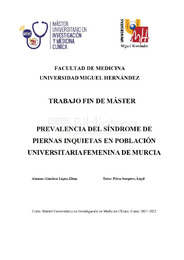Por favor, use este identificador para citar o enlazar este ítem:
https://hdl.handle.net/11000/27690Registro completo de metadatos
| Campo DC | Valor | Lengua/Idioma |
|---|---|---|
| dc.contributor.advisor | Pérez Sempere, Ángel Constantino | - |
| dc.contributor.author | Giménez López, Elena | - |
| dc.contributor.other | Departamentos de la UMH::Medicina Clínica | es_ES |
| dc.date.accessioned | 2022-09-23T13:27:47Z | - |
| dc.date.available | 2022-09-23T13:27:47Z | - |
| dc.date.created | 2022-05-19 | - |
| dc.identifier.uri | https://hdl.handle.net/11000/27690 | - |
| dc.description.abstract | Introducción: El Síndrome de Piernas Inquietas (SPI) es un trastorno neurológico del movimiento que se caracteriza por sensaciones desagradables en extremidades, predominantemente inferiores, que llevan a una necesidad imperiosa de moverlas. Su diagnóstico es clínico, sin embargo, se encuentra infradiagnosticado. Respecto a la prevalencia, los últimos estudios la estiman entre un 5-15 % en la población general. ipótesis y objetivos: El SPI es más prevalente en jóvenes universitarias con ferropenia. El objetivo principal de este trabajo será estudiar la prevalencia del síndrome de piernas inquietas en la población universitaria femenina de la región de Murcia durante el curso académico 2022-2023 junto con el análisis de la influencia de dicha ferropenia sobre el SPI. Como objetivos secundarios se estudiará la influencia de otros posibles factores relacionados con el SPI: factores de riesgo (antecedentes familiares, déficit de vitamina D o bebidas estimulantes) y factores protectores (anticonceptivos o suplementos de hierro). Además, se analizará el impacto del SPI en distintas áreas (rendimiento académico, calidad del sueño y calidad de vida). | es_ES |
| dc.description.abstract | Introduction: Restless legs syndrome is a neurological movement disorder characterized by unpleasant sensations in the extremities, predominantly the lower ones, which lead to an overwhelming need to move them. Its diagnosis is clinical, however, it is underdiagnosed. Regarding prevalence, the latest studies estimate it to be between 5-15% in the general population. Hypothesis and objectives: Restless Legs Syndrome (RLS) is more prevalent in young university students with iron deficiency. The main objective will be to study the prevalence of restless legs syndrome in the female university population of the Murcia region during the 2022-2023 academic year, together with analyzing the influence of said iron deficiency on RLS. As secondary objectives, the influence of other possible factors related to RLS will be studied: risk factors (family history, vitamin D deficiency or stimulating drinks) and protective factors (contraceptives or iron supplements). In addition, the impact of the SPI in different areas (academic performance, sleep quality and quality of life) will be analyzed. | es_ES |
| dc.format | application/pdf | es_ES |
| dc.format.extent | 48 p. | es_ES |
| dc.language.iso | spa | es_ES |
| dc.publisher | Universidad Miguel Hernández de Elche | es_ES |
| dc.rights | info:eu-repo/semantics/openAccess | es_ES |
| dc.rights | Attribution-NonCommercial-NoDerivatives 4.0 Internacional | * |
| dc.rights.uri | http://creativecommons.org/licenses/by-nc-nd/4.0/ | * |
| dc.subject | prevalencia | es_ES |
| dc.subject | síndrome de piernas inquietas | es_ES |
| dc.subject | mujeres | es_ES |
| dc.subject | jóvenes | es_ES |
| dc.subject | ferropenia | es_ES |
| dc.subject.other | CDU::6 - Ciencias aplicadas::61 - Medicina::616 - Patología. Medicina clínica. Oncología | es_ES |
| dc.title | Prevalencia del síndrome de piernas inquietas en población universitaria femenina de Murcia | es_ES |
| dc.type | info:eu-repo/semantics/masterThesis | es_ES |

Ver/Abrir:
GIMENEZ LOPEZ, ELENA_849041_assignsubmission_file_GIMÉNEZ LÓPEZ, ELENA .pdf
733,04 kB
Adobe PDF
Compartir:
 La licencia se describe como: Atribución-NonComercial-NoDerivada 4.0 Internacional.
La licencia se describe como: Atribución-NonComercial-NoDerivada 4.0 Internacional.
.png)